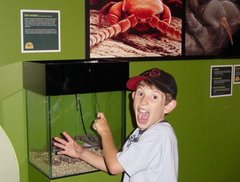This email just in from Jay Rounds:
Lynda,
Just got my copy of MUSEUM REVOLUTIONS, and the first thing I read was your article. Very interesting! Great idea to ask visitors about their own concepts of learning; the results proved very useful. I'm very intrigued by your question "do museums facilitate visitor learning despite themselves?" Have you developed that thought in more detail? My own take is that things make more sense when we move away from thinking of museums and visitors as if they were collaborating on a common task, and think of them having different jobs that intersect in ways that are very important, but strictly limited.
Jay
Lovely to hear from you Jay and glad you found the article useful. Since that paper I moved my thinking ahead quite substantially when I submitted my final thesis. Copies of various chapters and a more developed paper can be found on my wiki. Chapter 7 is probably the most useful summary of my work.
I found in my second stage that visitors played three different, yet simultaneous roles – museum expert, visit manager and learner facilitator. I think that's getting close to what you're asking? I do think that the emphasis on visitors as collaborators however is worthy of some further thought – certainly in my work around the virtual world that's one of the conclusions I'm coming to. I wonder if that will then manifest itself in the physical museum sense? I alluded to this in my thesis but am currently doing further research into these ideas. We had an initial discussion about this on the fresh+new(er) blog.
I also found that exhibitions impacted on visitors' learning identities in various ways, with some becoming even more convinced about how they did not want to learn in a museum after visiting a specific exhibition.
For those of you interested, more details about Museum Revolutions can be found on the University of Leicester website.
Thanks again Jay and love your work!


